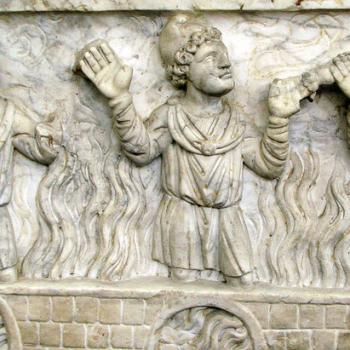
Do You Remember?
The writer of Psalm 111 intends to evoke a response of praise and thanksgiving through the rhythm and cadence of the Hebrew language by shining the light on God’s redemptive works. Psalm 111 is a Psalm to remember!
If you are of a certain age, you may remember the song, “Father Abraham” as a youngster, or you may have sung it to your children or a kids group at church. It is very catchy but also somewhat of an earworm – you know, a song that worms its way into your brain and doesn’t leave.
Father Abraham had many sons, and many sons had father Abraham. I am one of them, and so are you, so let’s just praise the Lord.
So for those of you who are now singing this song in your head – you’re welcome! But that is the point! A good kids’ song contains both a catchy tune and easy-to-remember lyrics. For parents with toddlers, Father Abraham is a great example. Children respond to fun music by clapping their hands, jumping up and down, or spinning.
Songs Do More Than Make You Feel Good
A good songwriter knows how to incorporate rhythm, cadence, and memorable lyrics to drive you either to insanity or to buy their song. In my office, I often play music by Abba (don’t judge), Billy Joel, the Carpenters, and Elton John. The music is catchy and instantly brings me back to the good carefree days of my childhood and early teen years. However, as we mature, we tend to listen to music with more substantive lyrics and more sophisticated musical content. Songs do more than make you feel good. Songs cause you to remember.
Music to Remember Scripture
The Bible is filled with warnings to remember. Music is a great tool to aid in memorizing Scripture. Many Christian and non-Christian music contains words from Scripture. For example, the Byrds’ classic hit Turn Turn Turn from 1965 is practically a direct quotation from Ecclesiastes 3:1-8. When I became a Christian 30 years ago, my first go-to favorite Christian musician was Keith Green. His songs were easy to sing, and more importantly, he bathed his lyrics in Scripture. For example, he wrote “I Will Give Thanks to the Lord” from his Songs for the Shepherd album, with Psalm 111 in mind.
Psalm 111 as an Acrostic
Psalm 111 is an excellent example of a beautifully crafted piece of lyrical poetry that serves to bring the congregation of Israel to a place of worship and gratitude for God’s magnificent works. This Psalm is also written as an acrostic set to music. In the original Hebrew, each line or verse begins with a new letter of the alphabet which aids in memorization. For example, the first word of the first line starts with the Hebrew letter, aleph. This verb translates, “to thank, praise, or confess.” The last word of the last line begins with the last letter of the Hebrew alphabet, tav. This word derives from the verb, hallel, meaning to praise or sing hallelujah. Praise bookends the entire Psalm in the original Hebrew.
Singing to Remember
I always teach my Biblical Hebrew students the Hebrew alphabet set to the song Yankee Doodle to help them learn the letters. Because of this, by the third class, they can usually sing it back to me because the melody helps them memorize. Remembrance is a key theme throughout the Old Testament. But unfortunately, the Israelites were often forgetful people!
Psalm 111 and God’s Covenant
Psalm 111 is replete with covenant language. God’s works are evidence that He keeps His promises to his people Israel in redeeming them! It is a Psalm sung by the congregation in celebration of God’s faithfulness. Moses’ song in Exodus 15 is a response to God’s works demonstrated in faithfulness by bringing Israel through the Red Sea and saving them from the Egyptians. It is a song of remembrance! Mary’s song in Luke 1 is a response to the joy of knowing she would give birth to Jesus – the Savior of the world.
Count Your Blessings
Years ago, we sang a hymn in our church called Count your Blessings, written by Johnson Oatman and Edwin Excell in 1897. The chorus reads
Count your blessings, name them one by one; count your blessings, see what God has done; count your blessings, name them one by one; count your many blessings, see what God has done.
As you can see, this repetitious hymn is a reminder that during difficulty, we can remember the works of God that have ultimately resulted in blessings to encourage us that God’s greater purposes redirect our perspective amid adverse circumstances. God again gives us fresh eyes to see that what He has done in the past, He will do likewise.
Remembrance in Exodus
Exodus 12 tells of Yahweh establishing the Passover as a ceremony to remember Him bringing Israel out of Egypt and out of slavery. It was a feast of celebration. After Moses received the Law on Mt Sinai, he was to place the tablets of stone containing the Ten Commandments in the ark of the covenant. Israel was to read the Law in the congregation, in the home, and be passed down from father to son. Thus, celebratory feasts were a way to express gratitude and thanksgiving. Also, the thanksgiving Psalms were the songs to be sung.
A Call to Remember
Let’s remember that God is in control in the midst of the chaos. So when circumstances overwhelm and cause your emotions to spiral down a bottomless pit, think of Psalm 111. Most of all, remember his salvation and the redemption he has given through his Son, Jesus! Meditate on Scripture, and may your response be like that of the Psalmist – Praise and gratitude!












